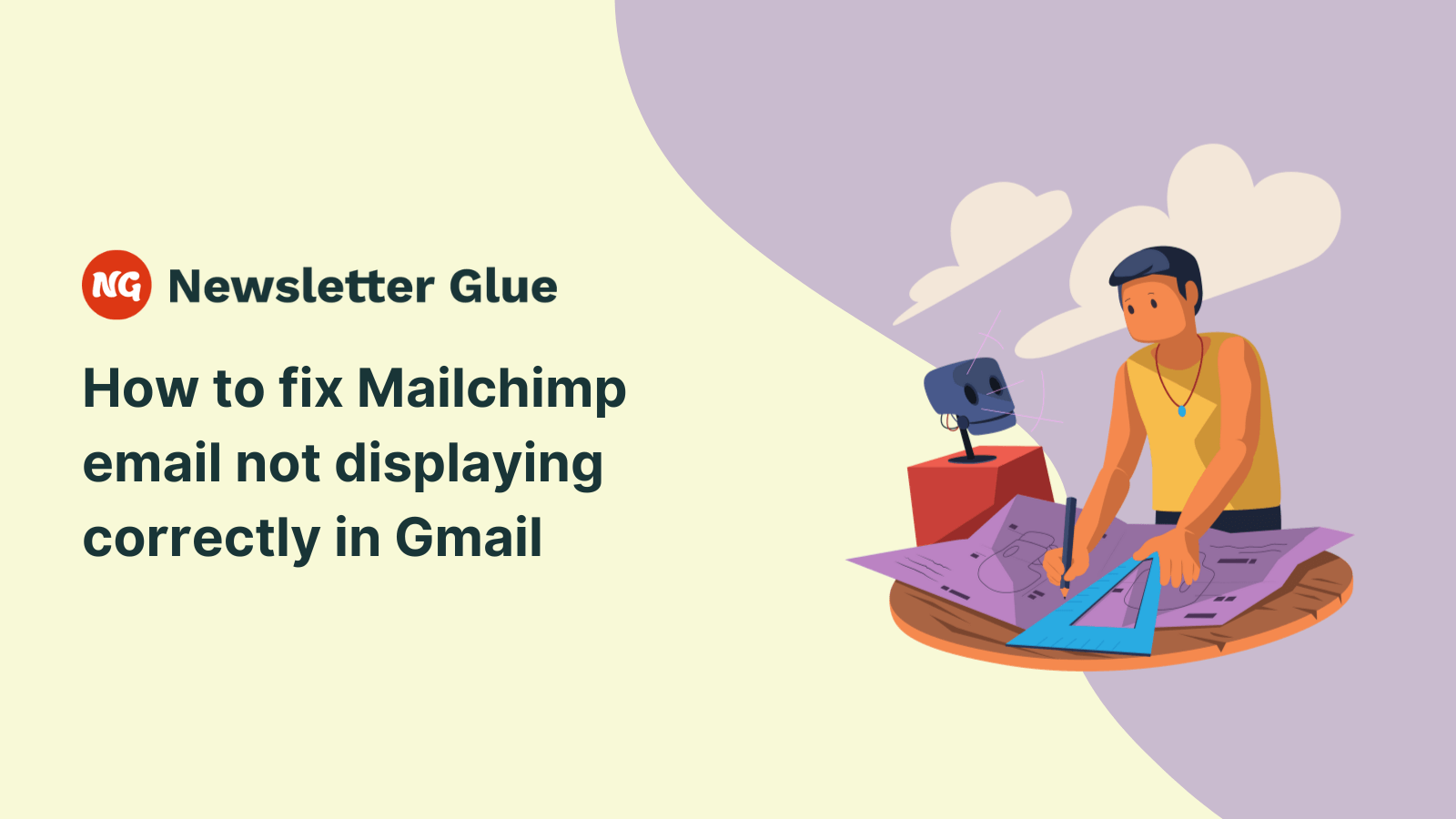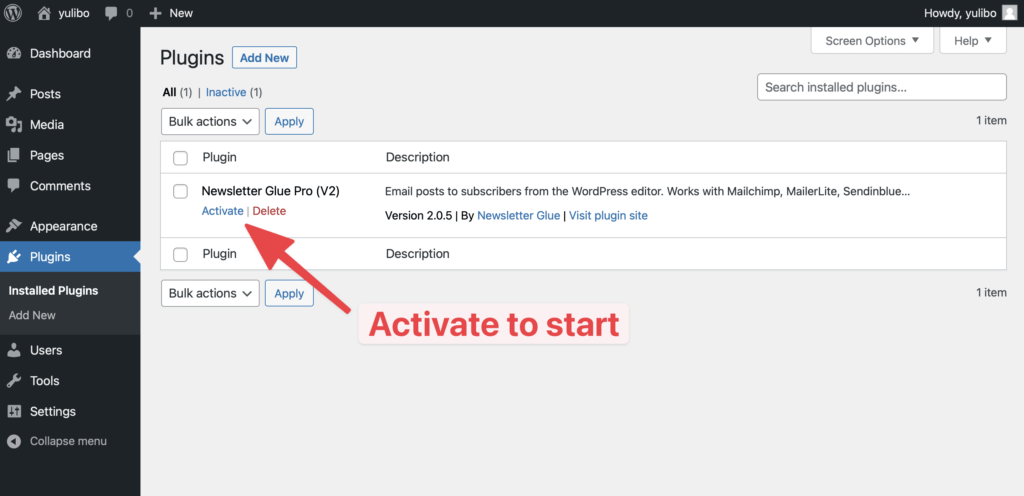You’re about to send an important email campaign but your Mailchimp email is not displaying correctly in Gmail when you send a test email.
All of your efforts to create the best email campaign will be pointless if users are unable to view your email properly.
In this article, we’ll look at the possible causes of Mailchimp not displaying emails correctly, as well as the possible solutions.
Possible causes of Mailchimp email not displaying correctly in Gmail
Incorrectly or poorly coded email HTML
One of the common reasons could be that the email is not correctly coded and is incompatible with Gmail.
Gmail has strict guidelines about the use of HTML and CSS in newsletters, which must be optimized for the correct rendering of emails.
Mailchimp uses a drag-and-drop email builder which creates an HTML template behind the scene.
If you write your email content in some other editor first and then copy it, chances are that you copy the formatting as well. This may not play well with the Mailchimp editor and your email will have an issue displaying correctly.
You can prevent this by directly writing content in the Mailchimp editor or by cleaning up the formatting using tools like Word to HTML.
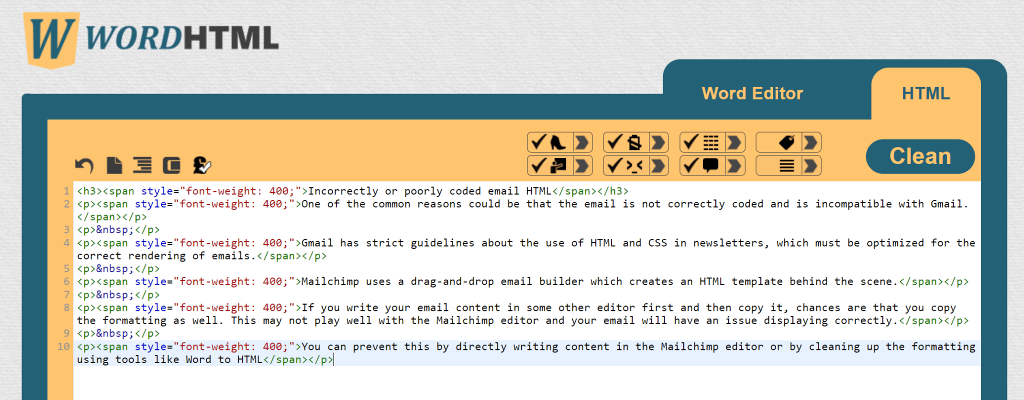
Gmail blocking images
Another possibility is that Gmail might be blocking the images used in the newsletter. To keep email sizes small, ESPs host images on their servers, which the email clients refer to as “external” images, and block them.
Gmail doesn’t block images by default, so if you’re seeing broken images in a test email, it’s most likely that the settings have changed on your device. In Gmail, click on Settings > See all settings on the top right corner and then scroll down to the Images section and make sure the option is set to Always display external images.
Enjoying this post?
Don't miss the next one.
Subscribe to get our latest product updates and blog posts.


Gmail clipping emails
Gmail is also known to clip emails that are bigger than 102kb in size. This phenomenon is known as email clipping and it hides the full content behind a “Message clipped. View entire message” link.
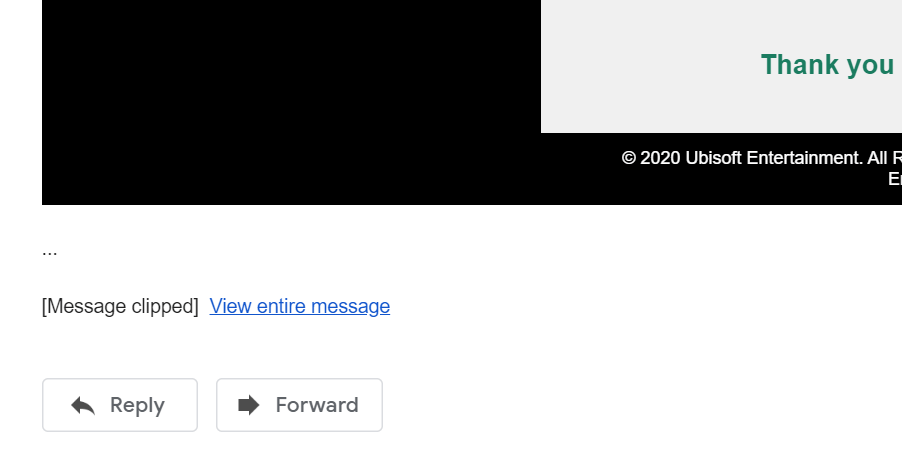
Of the three above-mentioned causes, email clipping is most often the problem. So let’s dig a little deeper and find out exactly why this happens and what we can do to solve it.
Why are my emails clipped and what happens as a result?
Only your HTML and CSS code is counted in the size of an email. Because images are hosted on third-party servers, they don’t add to the size of your email.
Gmail is known to cut off emails that are bigger than 102kb in size.
Some developers have reported an even lower cut-off limit. A good rule of thumb is to keep the email size under 90kb at all times. And test any email that goes above that (after all, it might not get clipped!)
Email clipping impacts the performance of your email campaign. It hides the CTA and footer section, which can impact the click through rate of your campaign.
It also reduces email deliverability as subscribers can’t find the unsubscribe link and mark emails as spam.
Your analytics stats also get messed up as most email service providers add an open rate tracking pixel at the bottom of emails. If the email is clipped, there is no way of knowing if the subscriber opened your email. You are likely to see lower open rates for that campaign.
How to prevent clipping inside Mailchimp
You can easily prevent email clipping inside Mailchimp by doing the following:
- Shortening and removing some of your email content in order to reduce the size and thus avoid email clipping. Unfortunately, this isn’t always an option if you have important information that can’t be removed.
- Remove extra code from Mailchimp. Mailchimp email builder often results in bloated code that isn’t needed. If you’re an experienced email developer or know someone who is, you can eliminate the extra code. However, it’s worth noting that email coding standards are very different from web development standards. So, if you aren’t familiar with the standards, your email might not render properly in certain email clients like Outlook. It’s also a good idea to run some tests using testi.ai, Litmus, or Email on Acid before sending your email campaign so you can make sure nothing breaks.
You can see how fast this gets complicated. Not everyone is a professional email developer, so let’s explore an easier way using Newsletter Glue.
It’s a newsletter builder that generates clean and lightweight code that’s heavily tested to work across most email clients. It also includes an email size checker, so you’re sure it’s within the desired limit before you hit “publish.”
How to solve Mailchimp email not displaying correctly in Gmail using Newsletter Glue
Newsletter Glue is a WordPress newsletter plugin that connects to various email service providers and allows you to create and send newsletters directly from the WordPress editor.
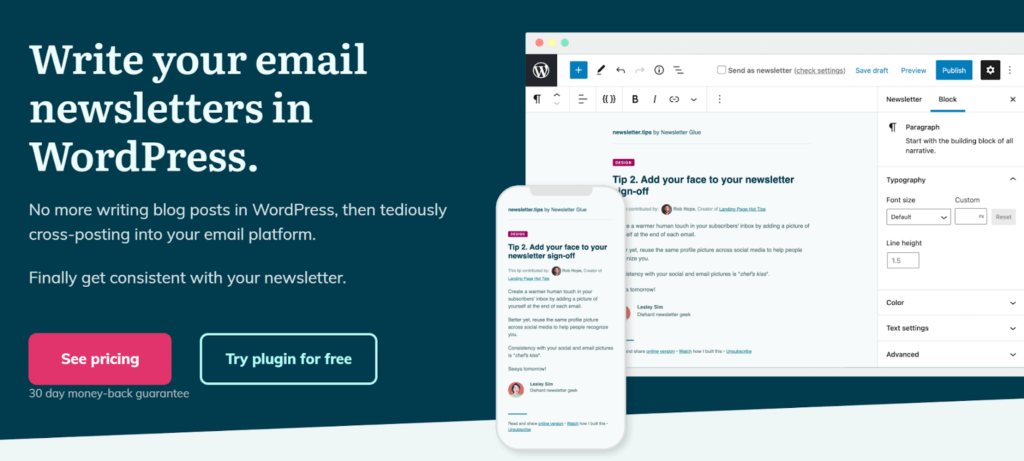
It saves you hours as you don’t have to manually copy and paste blog posts into Mailchimp anymore.
It also has a smart feature that shows you the estimated size of your newsletter before you publish it and warns you if your newsletter is at risk of being clipped in Gmail.
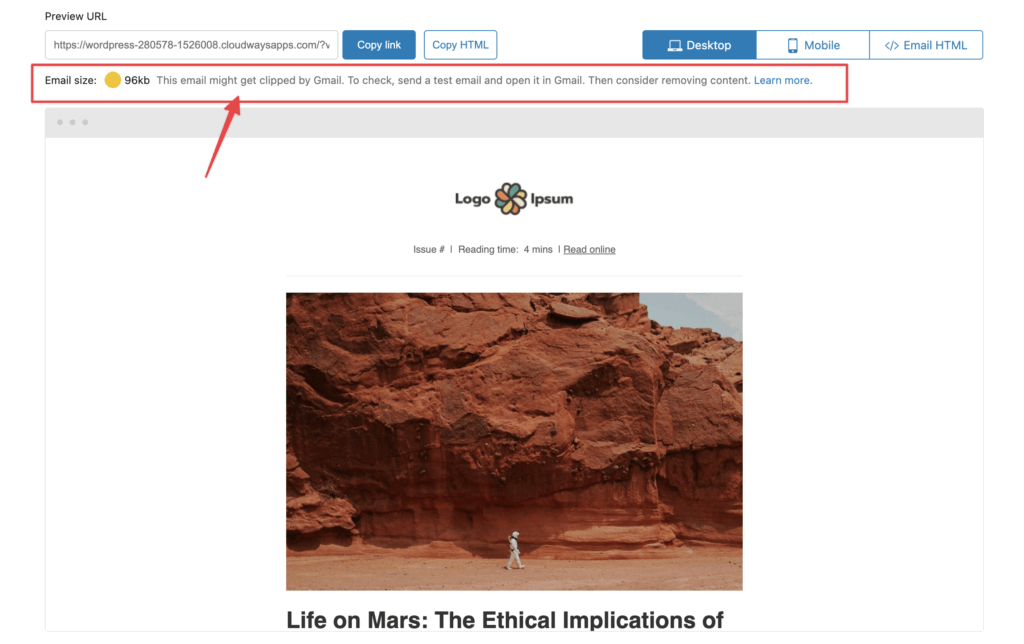
This feature is extremely useful for avoiding the issue of Mailchimp emails not displaying correctly in Gmail.
Enough about the plugin; let’s now look at how to install it and connect to Mailchimp via API to send newsletters directly from WordPress.
Install the Newsletter Glue plugin
To install the plugin, go to the Newsletter Glue website and purchase one of the paid plans. The paid plans start at $99/year and allow you to connect to various ESPs, including Mailchimp.
Once you purchase the plugin, download the plugin’s zip file from your account dashboard. Next, navigate to Plugins > Add New in your WordPress dashboard to upload and install it.
Click on the Upload Plugin button at top and select the zip file from your computer. Click Install and then activate the plugin.

As soon as you do so, the onboarding wizard will launch and walk you through the setup process.

Check email size for email clipping
After you’ve completed the setup, you can begin creating newsletters by going to Newsletters > Add New Newsletter.
This will launch the WordPress block editor, where you can add content using the various core blocks available. Newsletter Glue also comes with some useful newsletter specific blocks such as the metadata, post embed, show/hide content, author byline and more.
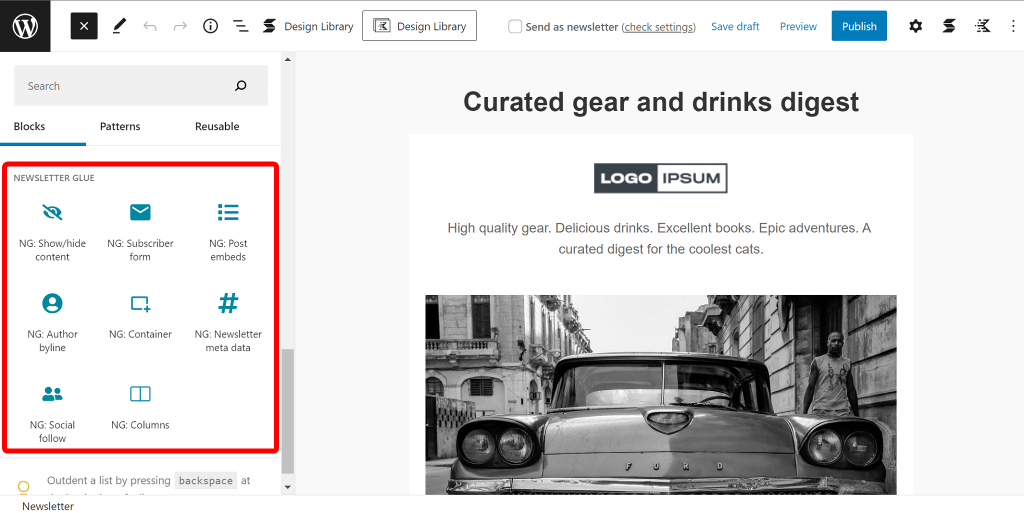
Once your newsletter is ready, scroll down to the bottom and look for the Newsletter Glue metabox. You can fill in all the details about the newsletter and then click on the “Preview email in browser” button.
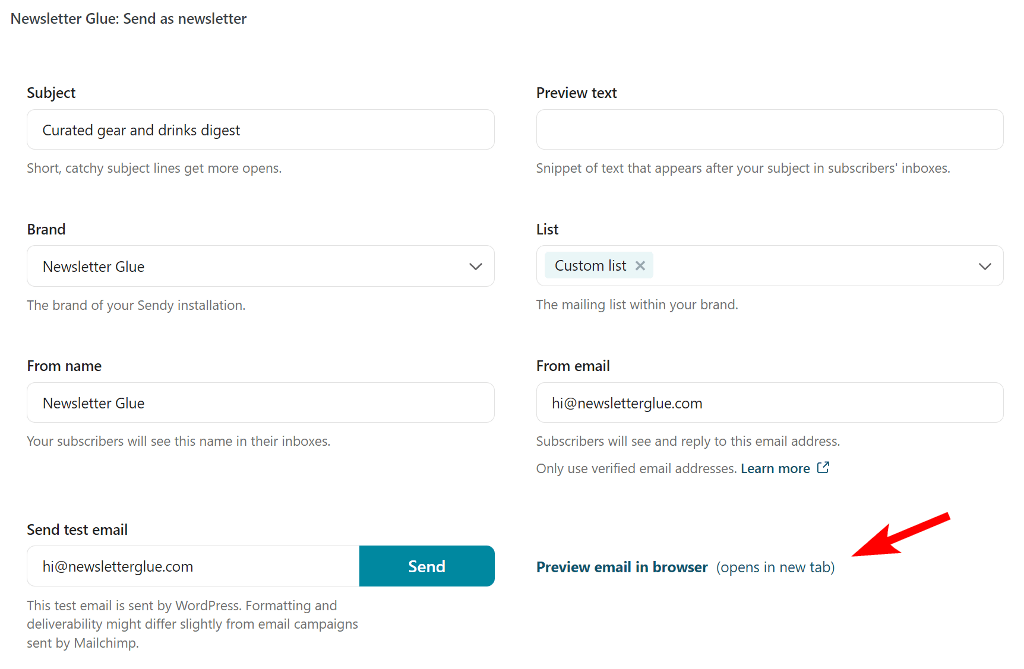
This will open the preview in a new tab where you’ll see the size of the email just above the preview.
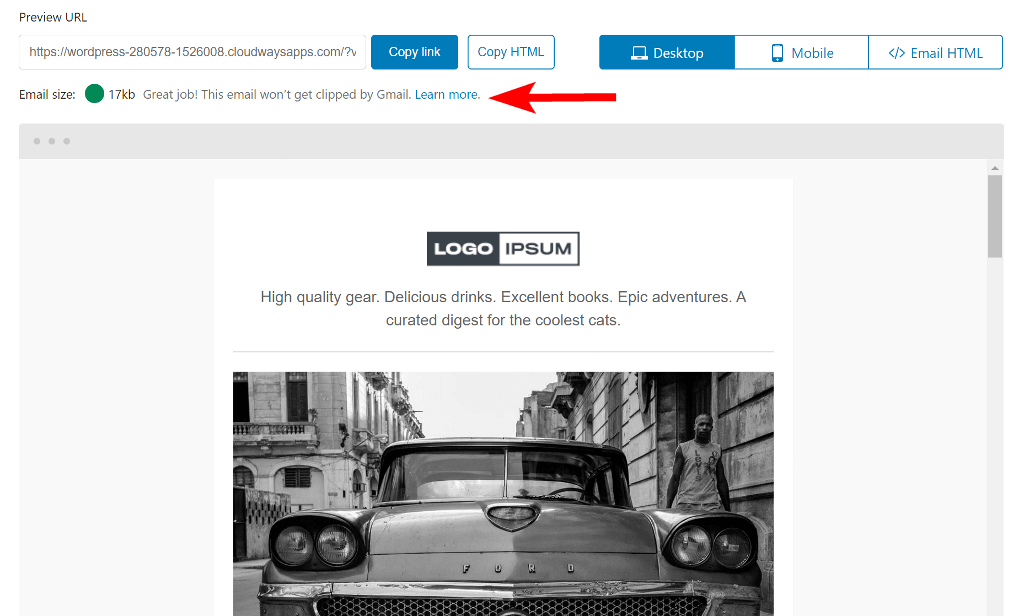
You’ll see three different lights based on the range in which the size of your email fits in.
- Green means your email won’t get clipped by Gmail. This is for email sizes of 89kb and less.
- Yellow means your email might get clipped by Gmail. This is for email sizes between 90kb – 97kb. You should send a test email, open it in Gmail and see if it gets clipped.
- Red means your email will most likely get clipped by Gmail. This is for email sizes above 97kb. You should send a test email, open it in Gmail and see if it gets clipped. If so, remove content until it doesn’t.
Based on the lights, you can optimize your newsletter to avoid email clipping and fix the issue of Mailchimp emails not displaying correctly in Gmail.
Wrapping up: Mailchimp email not displaying correctly in Gmail
There are many reasons why your newsletter is not displaying correctly in Gmail. Some of the most common reasons are un-optimized HTML templates, image blocking and email clipping.
HTML and image blocking can easily be fixed with the use of proper code and change of a setting. Email clipping requires special attention and can be avoided by keeping the email size below 90kb all the time.
One way to avoid heavy email code is to use a newsletter builder like Newsletter Glue. The WordPress plugin shows the email size in preview and tells you if your email is likely to be clipped in Gmail. It also lets you build clean and lightweight email newsletters that work across most email clients, including Outlook.

